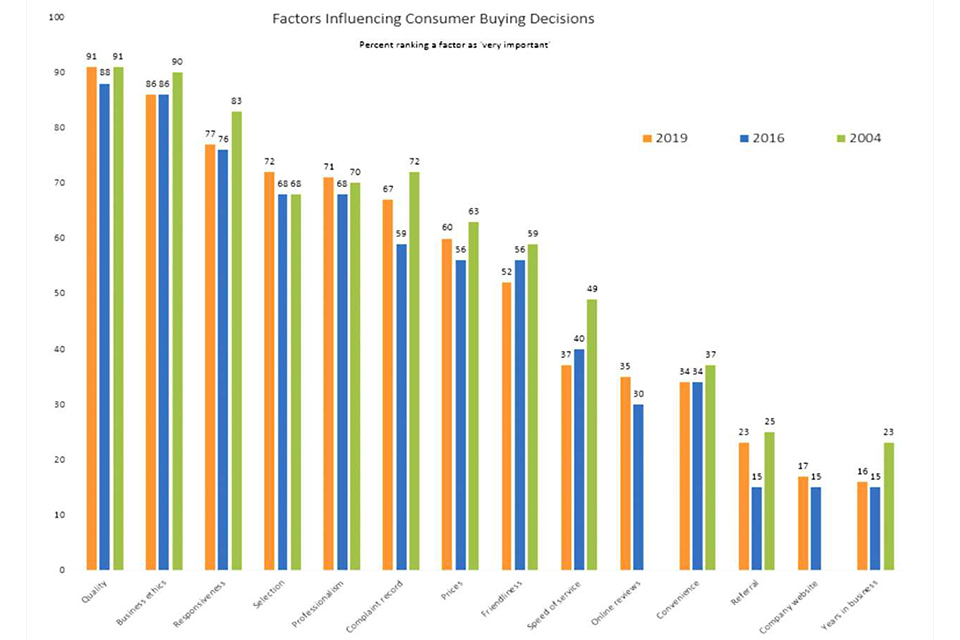SLU Marketing Professor, Better Business Bureau Examine Consumer Choices
A new survey by the Better Business Bureau (BBB) shows consumers continue to rank quality and integrity as top influential factors in choosing a business. Research analysis for the survey was conducted by James Fisher, Ph.D., professor of marketing and Emerson Ethics Fellow at SLU's Richard A. Chaifetz School of Business.
Over the past 15 years, the BBB and Fisher have periodically conducted a survey of consumers who have had a service interaction with BBB via its website or telephone. In these surveys, consumers were asked about crucial factors they consider when making buying decisions.
The survey was first conducted in 2004, then followed-up in 2016 and more recently in 2019. The results from the 2019 survey are based on the responses from more than 1,400 respondents from the St. Louis region, including eastern and southwest Missouri and southern Illinois. The results are summarized in the following chart. Once again, quality of products and services and business ethics are at the top of the list of influential factors.
While the top decision factors remain consistent, the marketplace is evolving in some important and distinctive ways. In 2016, the BBB offered the hypothesis that the consumer’s changing information environment – especially with respect to the ubiquitous presence of online information – resulted in some important shifts in shopping behavior. Thus, online reviews were reported as “very important” by 30% of the respondents in 2016. That same measure ticked upward to 35% in 2019. A company’s website likewise shifted upward slightly in 2019 as compared to 2016, but looking beyond the topline “very important” rating, the survey found that well over half of consumers indicate that a company’s presence online is either “very important” or “important.”
What creates value for consumers?
Quality (91%), selection (72%) and prices (60%), taken together, suggest that "value" is a key factor that influences buying decisions. While these variables are often associated with product value, they are also relevant for value-based decisions in selecting services. “Quality in a service or product is not what you put into it. It is what the client or customer gets out of it," says Peter F. Drucker. And as Warren Buffett reminds us, "Price is what we pay, value is what we get."
What creates a great customer experience?
Again, the survey points to a handful of variables that elevate shopping to more than a chore. These would be factors that relate to retailers’ expertise and their ability to relate that understanding to specific customer needs. Thus, responsiveness (77%) and professionalism (71%) are near the top of the list of factors that consumers seek.
The survey also suggests that the quality of customer experience will be determined by how easy and pleasurable it is. Consumers often want their sales transactions to be frictionless. Therefore, in the middle of the pack of factors the survey finds considerations like “friendliness” (52%), speed of service (37%) and convenience (34%) as “very important.”
What do these findings mean for businesses?
Consumers expect more. Marketers have been promising best selection and lowest prices since the dawn of advertising. Consumers continue to hear such claims but are now more likely to seek credible assurances before accepting these blanket assertions. And with better communications and increased transparency lighting up our smartphone screens, customers have the means for verification. Business managers must understand, explain and then stand behind the value they claim to create.
Good ethics = clear communications + skilled responsiveness. BBB research of customer complaints reveals that many claims of unethical treatment begin with poor communications and a lack of follow-up. Proactive businesses prevent this by setting expectations appropriately and then delivering in a way that avoids misunderstandings and surprises.
Understand the new marketing landscape. Effective marketing has previously relied upon outbound techniques like advertising, direct mail and personal selling. The new paradigm – more focused on attracting “inbound” customer traffic – requires facilitating the consumer journey from start (search on the web) to finish (low-cost fulfillment and delivery). Increasingly this type of marketing is digital in character and requires skills related to search-engine marketing and social media.
To recap, consumers surveyed reported that the most important factors influencing their buying decisions are product/service quality, responsiveness, professionalism, selection and complaint record. Consumers place more importance on a company's ethics than in their website, reviews, or years in service.
High standards of business conduct are key to providing consumers with assurances that their business counterparties are trustworthy and fair.
The results also should alert retailers and other business operators to the fact that the mere assertion of high business ethics is not enough. Consumers will continue to consider tried and true methods to gauge integrity like BBB’s ratings and complaint record (67%), referrals of friends (23%) and the tenure of the business itself (16%). In addition, newer online channels – reviews (35%) and websites (17%) – will most likely continue to grow influence.
Note: Of the 1400 survey respondents, 54% reported as female; 62% as married; 83% Caucasian; 77% as 55 or older; 61% as college graduates or beyond and 42% with household incomes as greater than $80,000.



















